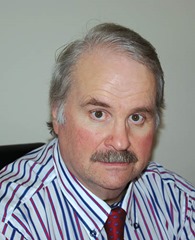Irwin Armstrong interview: a local link to Downing Street
 Peter Cheney interviews Northern Ireland Conservative Chair Irwin Armstrong about the party’s national influence and regional economic policies.
Peter Cheney interviews Northern Ireland Conservative Chair Irwin Armstrong about the party’s national influence and regional economic policies.
For a long time after the general election, David Cameron declined to meet Peter Robinson and Martin McGuinness and instead directed them to the NIO. The Prime Minister was, though, meeting a Ballymena businessman in his role as Chair of the Northern Ireland Conservatives and connections have become closer since then.
“I’ve met him on three occasions here so far,” Irwin Armstrong tells agendaNi two days into the conference. “I can talk directly to him. I can write to him. I get replies from him so we can have an input into the party.”
Armstrong’s tone is modest but he runs an expanding manufacturing firm – CIGA Healthcare – operating in 72 countries. He has been a member of the Conservatives since 1997.
“As the economy improves, the prospects for a shared future get much better,” he comments. Armstrong expects that more jobs and higher incomes will move people “more into the middle” but the forthcoming three-year cycle of elections is “driving the parties to the extremes.”
This is leaving a “gaping hole” in the middle ground of politics at a time when turnout is declining. He strongly supports a viable opposition in the Assembly: “At the moment, it doesn’t matter how you vote. You just get the same again.”
Several parties occupy that centre ground and also call for the reshaping of Stormont. Pressed on this, Armstrong firstly points to the Conservatives as a national party with no interest in sectarian divisions.
“We’re really not focused on orange and green,” he remarks. “That’s not what we’re about.” The Conservatives, naturally, are unionist but are relaxed about North/South and east-west co-operation.
Likewise, they are clearly centre-right whereas most local parties take in a range of ideological views. Armstrong finds that even Sinn Féin has ‘conservatives’ in its ranks, believing in smaller government and lower taxes.
Turning to the Alliance Party, Armstrong says that it lacks a “core value” and instead differentiates itself by not being unionist or nationalist. Some Alliance members are centre-left and others centre-right. The DUP, UUP and NI21 are also an “amalgam of left and right.”
Local Conservatives have access to senior ministers through their contacts with Cameron and Theresa Villiers.
One tangible result was the in camera meeting of local business and civil society leaders at the G8 Investment Conference, allowing Cameron to put forward his thoughts on the future of Northern Ireland and hear their views.
George Osborne’s “no more free unemployment” policy was his main conference highlight. People who present themselves as ready for work “should not be allowed to sit at home and do nothing.” However, he recognises the need to help unemployed people with poor literacy and numeracy and also that a safety net is needed for people who cannot work e.g. due to poor mental health.
Unemployment is sustained by a lack of jobs. Responding to that point, he accepts that 30,000 jobs need to be created to bring Northern Ireland back to full employment. At least some of those jobs will come from recovery in the construction sector.
The Conservatives’ economic proposals include high value branding for agri-food produce (following Scotland’s example). They also press for full devolution of air passenger duty and opening up public services to competition e.g. Translink, Housing Executive, Social Security Agency and Driver and Vehicle Agency.
Armstrong finds that the improving economic situation has given members “a big lift” and the party has also “sharpened its message considerably” over the last year under Lynton Crosby.





